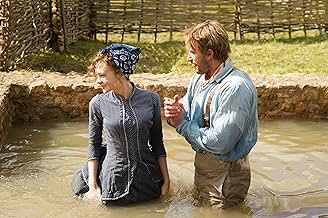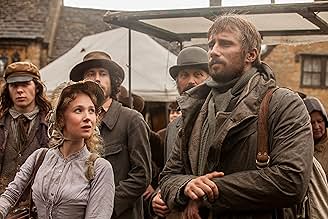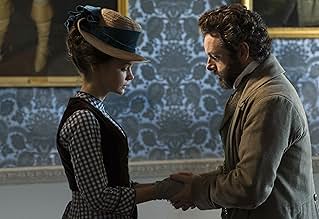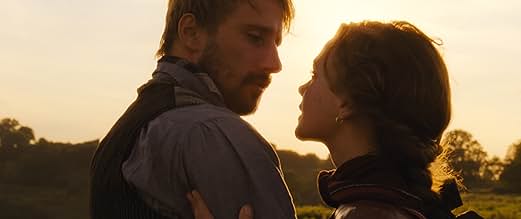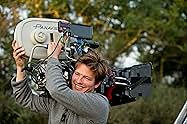Im viktorianischen England zieht die unabhängige und willensstarke Bathsheba Everdene drei sehr unterschiedliche Verehrer an: Gabriel Oak, einen Schäfer; Frank Troy, einen verwegenen Sergean... Alles lesenIm viktorianischen England zieht die unabhängige und willensstarke Bathsheba Everdene drei sehr unterschiedliche Verehrer an: Gabriel Oak, einen Schäfer; Frank Troy, einen verwegenen Sergeant; und William Boldwood, einen wohlhabenden und älteren Junggesellen.Im viktorianischen England zieht die unabhängige und willensstarke Bathsheba Everdene drei sehr unterschiedliche Verehrer an: Gabriel Oak, einen Schäfer; Frank Troy, einen verwegenen Sergeant; und William Boldwood, einen wohlhabenden und älteren Junggesellen.
- Regie
- Drehbuch
- Hauptbesetzung
- Auszeichnungen
- 2 Gewinne & 11 Nominierungen insgesamt
Empfohlene Bewertungen
In a time ruled and defined exclusively by men, Bathsheba Everdene (Carey Mulligan) stands apart as a free-spirited, independent young lass who refuses to bow to convention. When she inherits the farm belonging to her late uncle, she insists on running it herself - working in the fields and sacking the male workers who disrespect her authority. Small wonder, then, that Bathsheba draws the attention of three suitors, each one representing a different social class and a unique brand of manhood: stoic farmer Gabriel Oak (Matthias Schoenaerts); stern, serious-minded landowner William Boldwood (Michael Sheen); and sexy, emotionally scarred sergeant Francis Troy (Tom Sturridge).
The main problem with Hardy's novel, which is largely replicated in Vinterberg's faithful adaptation, is its awkward attitude towards its lead female character. To be sure, Hardy gives Bathsheba a modern voice that still rings true today: "It is difficult for a woman to define her feelings in a language chiefly made by men to express theirs," she declares. It's a line so delicious that screenwriter David Nicholls nicked it wholesale for the film. And yet, on a deeper reading of the novel, it becomes far harder to tell whether Hardy is celebrating Bathsheba's independence, or punishing her for it.
To their credit, Vinterberg and Nicholls do try a little harder to add a truly feminist bent to their version of Bathsheba's story. More care is taken to forge a genuine emotional connection between Bathsheba and Gabriel, even as her seduction of William Boldwood is made less purposeful. Bathsheba still finds herself approaching Sergeant Troy with lust rather than caution, but she does so in a more clear-eyed manner. In effect, Mulligan's Bathsheba seems bemused at and somewhat resigned to the sillier decisions she makes in her romantic pursuits.
The trouble is that, while these little changes do add up to a stronger character, they also result in thematic and tonal confusion. The truth of the matter is that Hardy was not always concerned with celebrating Bathsheba as a character in her own right - he was frequently more interested in commenting on the ideal romantic suitor, the kind of man to whom Bathsheba should give her heart. There's never any doubt, in Hardy's mind at least, what her choice should be. After a point, then, Vinterberg's film flounders because there is, truthfully, no real tension in the romantic dilemma that stares Bathsheba in the face.
It's a shame, because Vinterberg has brought Hardy's world to life with a very good cast indeed. Mulligan plays the fire and spirit of Bathsheba well, although she's trapped as much by the script as her character is by Hardy's words and ideas in the novel. As the sturdy Gabriel Oak (his surname says it all), Schoenaerts turns a rather dull but handy lump of a man into a semi-credible romantic prospect. The ever-reliable Sheen doesn't have quite enough screen-time, but nevertheless packs a great deal of depth and despair into the loss of William Boldwood's heart (and, perhaps, mind) to the charms of Ms. Everdene. There's almost more to be enjoyed in the semi-confessional scene shared by these two very different men as they sheepishly dance around their feelings for the same woman. Sturridge, meanwhile, is the relatively weaker link in the cast; his performance is fuelled more by his sexy moustache and saucy swordmanship than anything else.
At a point in time when female-led films are being discussed, dissected and celebrated more than ever before, Far From The Madding Crowd would - at least on the surface - appear to be part of this growing tradition. The filmmakers have certainly tried to create a version of Bathsheba Everdene that's unequivocally appealing to a modern audience. But it's an effort that, ultimately, doesn't quite work, since the point of Hardy's novel was arguably more about the man Bathsheba should marry, and less about Bathsheba herself.
Vinterberg has set himself a difficult task. Schlesinger's film was a landmark of British cinema, marking the beginning of what I have come to think of the "heritage cinema" style of film-making. In my eyes at least, and I suspect in the eyes of many others, it has become the definitive version; I cannot re-read the novel- it is a favourite of mine and I have read it several times- without picturing Bathsheba as Julie Christie, Gabriel as Alan Bates, Troy as Terence Stamp or Boldwood as Peter Finch.
Like Schlesinger, Vinterberg sticks fairly closely to Hardy's story, although of necessity some minor episodes have had to be omitted. There were one or two touches I didn't really care for, such as the scene where Troy grabs Bathsheba by the crotch. In the novel Hardy describes Troy's seduction of the young woman with great delicacy. This is not just a question of Victorian prudery, but also of psychological realism. A girl as independent and determined as Bathsheba would have resented such a crude approach; had Troy attempted it he would doubtless have got his face slapped for his pains. I also felt that this version rather inflated the social status of both Bathsheba and Boldwood. In the novel both are prosperous farmers, but nothing more. Here they live in the sort of style which would suggest she is the Lady of the Manor and he a wealthy aristocrat.
Hardy's novel is, among other things, a celebration of the English countryside, and this aspect is brought out well here. Like Schlesinger's, the film is visually attractive with some striking photography of the rural landscapes, often seen bathed in a soft, golden glow. On the acting side I was most impressed by Matthias Schoenaerts as Gabriel. His interpretation is rather different from Bates's, making his character perhaps more genteel and less rough-hewn, but still a man of great sensitivity and integrity. The Belgian-born Schoenaerts speaks flawless English with no hint of a foreign inflection, although it is noticeable that, unlike Bates, he does not attempt a West Country accent. Possibly wisely- English regional accents can be notoriously difficult for foreign-born actors.
On the other hand, I was less impressed by Tom Sturridge who makes an unmemorable Troy, lacking the roguishness and devil-may-care charm which Stamp brought to the role. Michael Sheen is better as Boldwood, but never quite matches Finch's desperate, nervous intensity. The difference, perhaps, is that Sheen's Boldwood is obsessed by Bathsheba whereas Finch's is almost literally possessed by her. Carey Mulligan has plenty of experience in films of this type, having inherited the crown formerly worn by Helena Bonham-Carter and Keira Knightley, that of Reigning Queen of Period Drama. She has been praised for her performance here, but personally I preferred Christie's rather more imperious and headstrong interpretation. Vinterberg's film is a generally solid, well- made piece of period drama, but for me it will not replace Schlesinger's as the definitive version. 7/10
The final whitewashing of this script's plot is the moral omittance of her not speaking up for Boldwood. Rescued from a threatening situation it is her testimony that could save a life, but as before she walks away. This script has her succeeding, but the film leaves little sense of the destruction she left in her path.
Carey Mulligan delivers a brilliant performance as the nearly modern woman in a world still ruled by men. She's a complicated heroine and could be derided for her uncertain love life. The three men deliver the needed personality. Michael Sheen is probably the least like his distant socially awkward character. I would have liked the movie to concentrate more on Oak but that wouldn't be the story. This is a lovely addition to the classic.
Thomas Hardy would make a fortune today writing soap opera period pieces like Far from the Madding Crowd for HBO. That's a compliment because this film is done with such restraint (far fewer gratuitous country-beautiful shots and more close ups) that it could have been set in any era and the human condition would be the same.
Besides its fidelity to the spirit of Hardy's typically bright, tough farm girl ("I have an education. Nothing else"), class division, complicated loves, Far offers a heroine, Bathsheba (well-cast, crooked smiling Mulligan) far ahead of her time (See the above quote). Although she doesn't want for suitors, she doesn't want to be subjugated by a husband either ("being some man's property"). Katherine Hepburn could have played this role.
As life and Hardy would have it, chance and human nature have their own agendas, and Bathsheba makes bad decisions based on youthful passion and naiveté—Hardy, frequently a figurative scold, makes sure she pays amply for her mistakes before he sets the balance right between fortune and misfortune. His more famous Tess of the d'Urbervilles is the finest example of the strong-willed, suffering heroine, who, because of weak men, is mercilessly buffeted by the fates and her own weakness.
One of Bathsheba's suitors, the painfully shy William Boldwood (Michael Sheen), personifies the aging Victorian society, bound in property and loneliness; to her he importunes, "I want very much to protect you for the rest of your life." However, the temporary prize of Bathsheba is given to the crimson-uniformed rake, Sergeant Francis Troy (Tom Sturridge), another character waiting for Hardy's punishment.
The obvious right guy for her is farmer Gabriel Oak (Matthias Schoenaerts), whose steadfast love for the heroine could only be compared to Job's suffering. To her he always speaks honestly and lovingly: "I'm not going to tell stories just to please you. You can be sure of that."
Far from the Madding Crowd is a crowd pleaser. Hardy would have loved the adaptation.
Wusstest du schon
- WissenswertesAsked who she would have chosen if she had these three very different suitors in real life, Carey Mulligan chuckled as she quickly replied, "I probably would have gone for the guy with the baby lamb (Gabriel) in the first 20 minutes of the film."
- PatzerIn the final scene when Gabriel leaves the farm he is wearing white trousers and white shirt with a dark waistcoat but shortly later when B catches up with him he is dressed in completely different clothes.
- Zitate
Bathsheba Everdene: It is difficult for a woman to define her feelings in a language chiefly made by men to express theirs.
Top-Auswahl
Details
- Erscheinungsdatum
- Herkunftsländer
- Offizieller Standort
- Sprache
- Auch bekannt als
- Lejos del mundanal ruido
- Drehorte
- Mapperton, Beaminster, Dorset, England, Vereinigtes Königreich(Bathsheba Everdene's farm)
- Produktionsfirmen
- Weitere beteiligte Unternehmen bei IMDbPro anzeigen
Box Office
- Budget
- 12.000.000 £ (geschätzt)
- Bruttoertrag in den USA und Kanada
- 12.236.500 $
- Eröffnungswochenende in den USA und in Kanada
- 164.985 $
- 3. Mai 2015
- Weltweiter Bruttoertrag
- 30.599.369 $
- Laufzeit1 Stunde 59 Minuten
- Farbe
- Sound-Mix
- Seitenverhältnis
- 2.35 : 1
Zu dieser Seite beitragen








